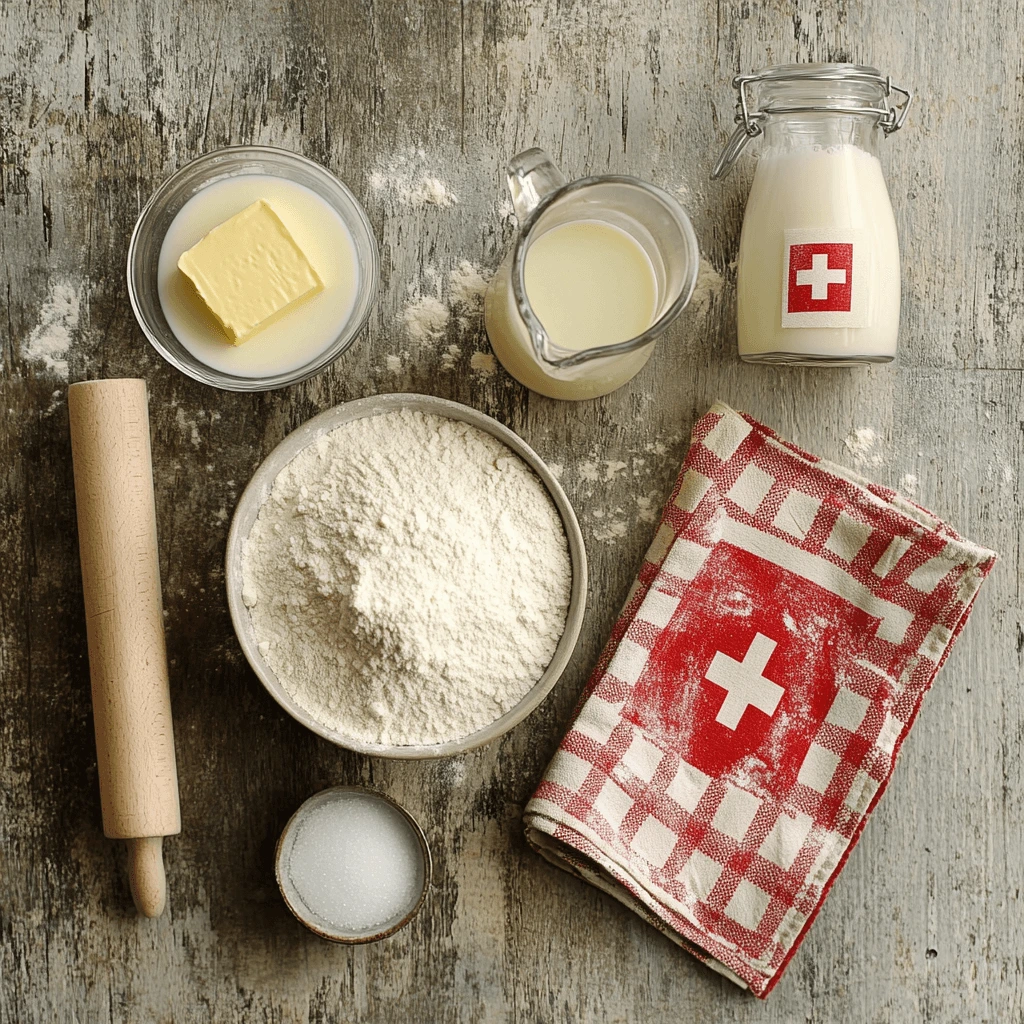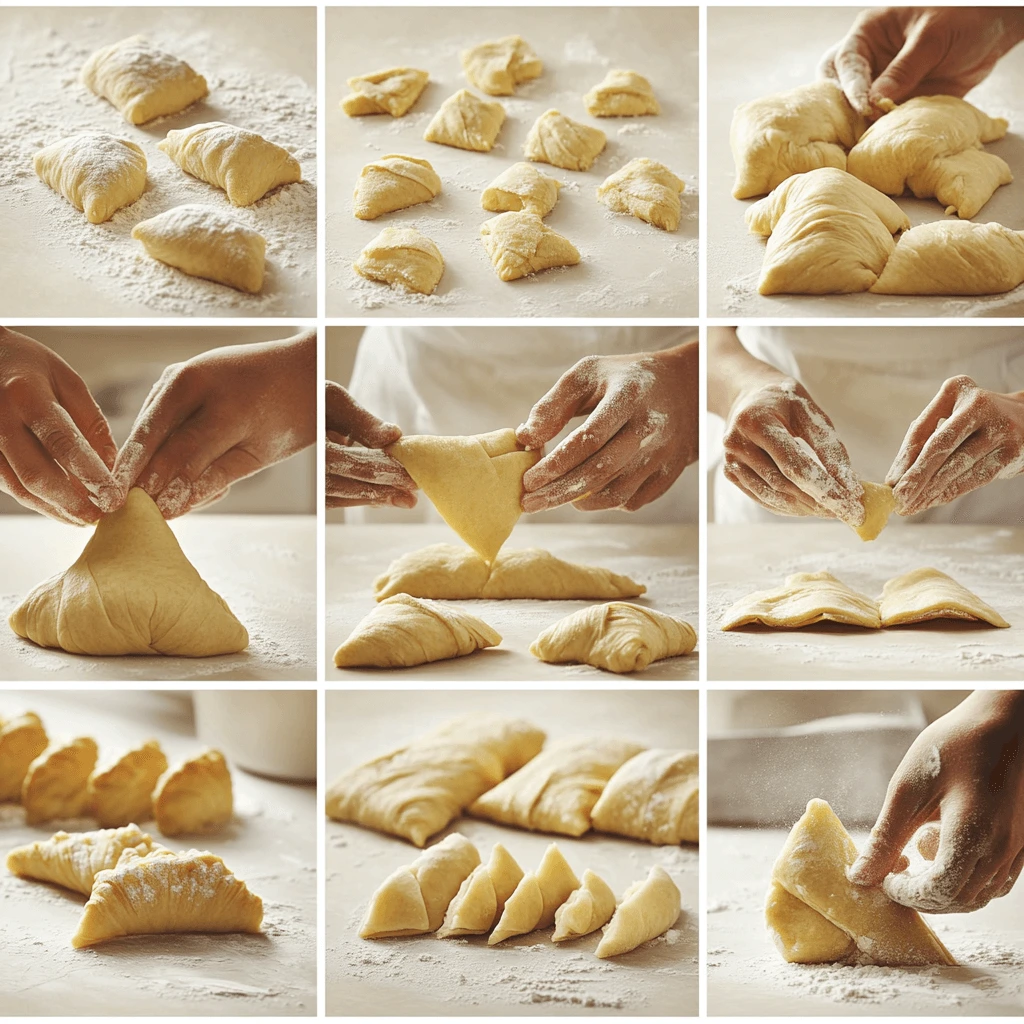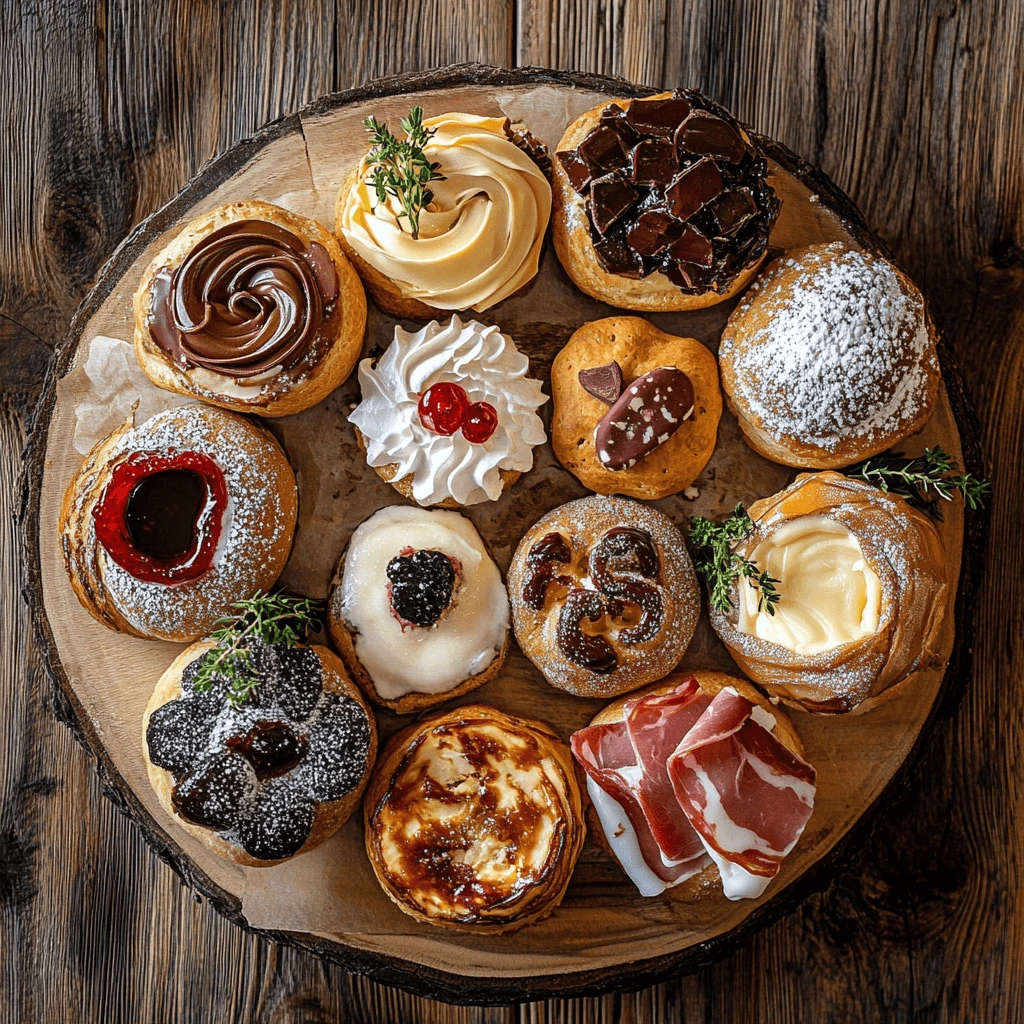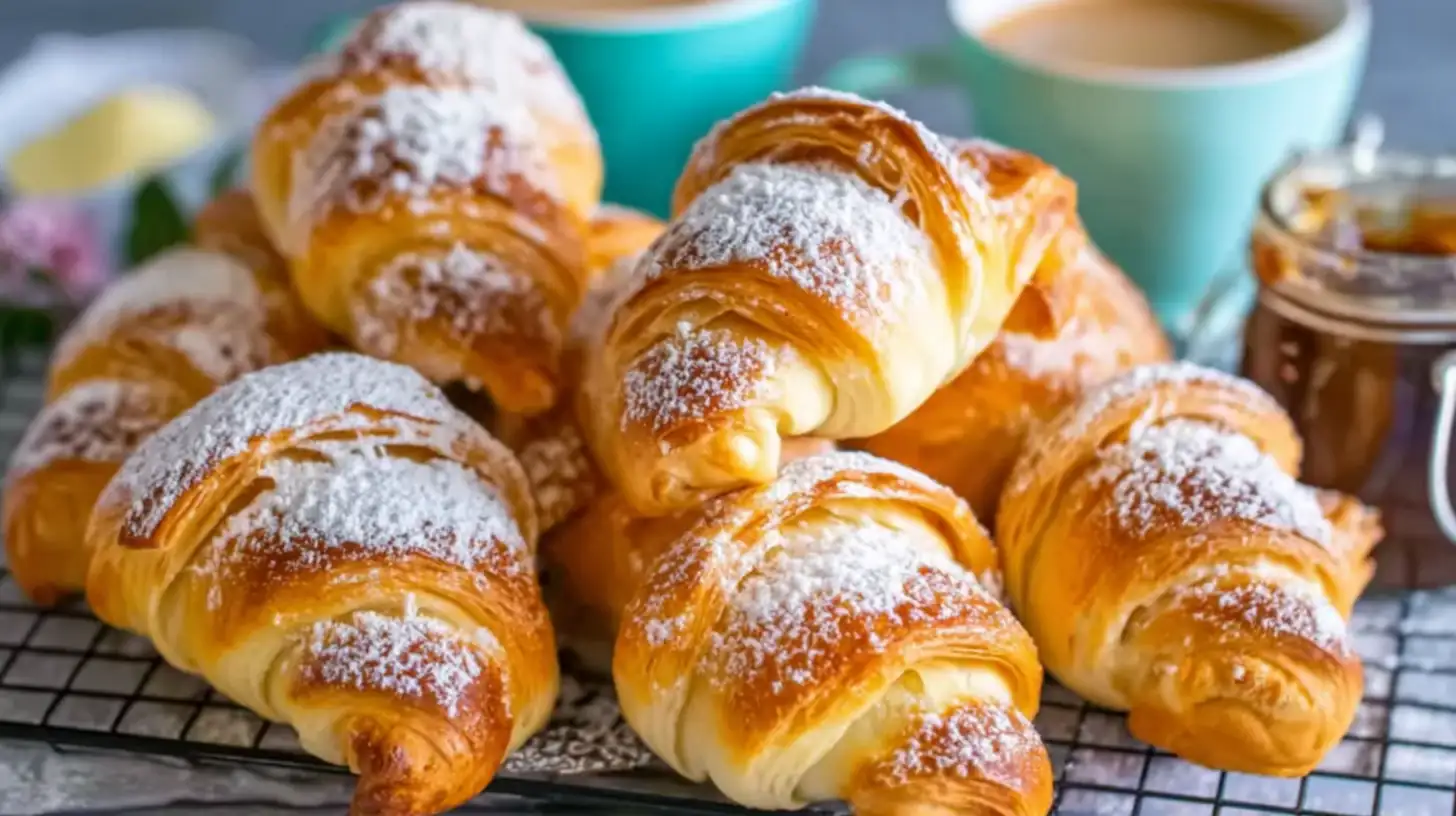
Gipfeli Recipe: How to Make Perfect Swiss Pastries at Home
- Total Time: 2 hours 30 minutes
- Yield: 12 Gipfeli 1x
- Diet: Vegetarian
Description
Learn how to make traditional Swiss Gipfeli, a lighter, flakier version of the croissant, perfect for breakfast or a snack.
Ingredients
4 cups all-purpose flour
1 cup unsalted butter, cold
1 packet active dry yeast (about 2 1/4 tsp)
1 1/4 cups warm milk
2 tbsp sugar
1 tsp salt
1 egg (for egg wash)
Optional: chocolate chips, almond paste, jam, cheese, ham
Instructions
1. Mix warm milk, sugar, and yeast. Let sit until frothy.
2. Combine flour, salt, and yeast mixture. Knead until smooth.
3. Let dough rise until doubled in size, about 1-2 hours.
4. Roll dough into a rectangle. Spread butter over two-thirds.
5. Fold dough like a letter. Chill 30 minutes.
6. Repeat rolling and folding 2-3 times.
7. Roll dough to 1/4 inch thickness. Cut into triangles.
8. Roll each triangle from base to tip to form crescents.
9. Place on parchment-lined baking sheet. Proof 30-45 minutes.
10. Brush with egg wash. Bake at 375°F (190°C) for 15-20 minutes until golden.
Notes
Keep butter cold to maintain layers.
Chilling between folds is essential.
Store in airtight container up to 3 days or freeze unbaked shaped Gipfeli.
- Prep Time: 2 hours
- Cook Time: 20 minutes
- Category: Pastry
- Method: Baking
- Cuisine: Swiss
Nutrition
- Serving Size: 1 Gipfeli
- Calories: 280
- Sugar: 3g
- Sodium: 180mg
- Fat: 15g
- Saturated Fat: 9g
- Unsaturated Fat: 5g
- Trans Fat: 0g
- Carbohydrates: 28g
- Fiber: 1g
- Protein: 5g
- Cholesterol: 45mg
Table of Contents
Growing up in Asheville, my mornings often started with the scent of warm pastries, but it wasn’t until a trip to Switzerland with my grandmother Mabel that I tasted my first Gipfeli. We sat in a tiny café overlooking Lake Geneva, sharing flaky, buttery crescents that felt both familiar and entirely new. Lighter than a croissant, yet just as comforting, Gipfeli became a quiet obsession for me. Today, I’m sharing the Gipfeli recipe that brings back those lakeside mornings – flaky layers, buttery richness, and simple joy – all made right in your own kitchen, with tips and variations for every baker.
What Is Gipfeli and Why Is It Special?
Origin of Gipfeli
The Gipfeli, often referred to as the Swiss croissant, has a rich history rooted in European pastry traditions. Its name comes from the Swiss-German word for “crescent,” reflecting its shape. Emerging in Switzerland during the 19th century, Gipfeli became a lighter, less buttery adaptation of the French croissant, tailored to Swiss tastes.
Gipfeli is cherished across Switzerland, where it’s a popular breakfast option enjoyed with coffee or hot chocolate. Regional variations include sweet fillings like chocolate or almond paste in French-speaking areas and savory options in other parts of the country.
What Makes the Gipfeli Recipe Unique?
Unlike French croissants, Gipfeli is slightly denser and less rich, making it a lighter choice. This balance of texture and flavor is what sets it apart, offering a taste that’s uniquely Swiss.
Cultural Significance
More than just a pastry, Gipfeli is an integral part of Swiss culture. Found in bakeries, cafés, and homes across the country, it symbolizes tradition and comfort. Whether store-bought or homemade, it remains a timeless favorite.
Essential Ingredients for Your Gipfeli Recipe

Essential Ingredients for Your Gipfeli Recipe
- Flour: All-purpose flour works best for this recipe.
- Butter: High-quality unsalted butter is crucial for the flaky layers.
- Yeast: Use active dry yeast for optimal rise.
- Milk: Adds richness to the dough.
- Sugar and Salt: For flavor balance.
Optional Fillings
- Sweet Fillings: Chocolate, almond paste, jam.
- Savory Fillings: Cheese, ham, or cream cheese.
Tips for Choosing Ingredients
- Opt for fresh yeast and high-fat butter for the best results.
- If you prefer a healthier version, substitute whole wheat flour for some of the all-purpose flour. And if you’re curious about other layered pastries, try our Braided Chocolate Chip Brioche recipe for a similar baking experience.
- Use high-quality chocolate or locally made jam for an extra touch of flavor.
Step-by-Step Guide to Your Gipfeli Recipe

1. Preparing the Dough
- Mix warm milk, sugar, and yeast. Let it sit until frothy, which takes about 5-10 minutes.
- Combine flour, salt, and yeast mixture. Knead until smooth and elastic, about 10 minutes by hand or 5 minutes in a stand mixer.
- Cover the dough with a clean towel and let it rise in a warm place until doubled in size, approximately 1-2 hours.
2. Creating the Layers
- Roll out the dough into a large rectangle on a lightly floured surface.
- Spread softened butter over two-thirds of the dough. Fold the unbuttered third over the center, then fold the remaining buttered third on top (like folding a letter).
- Chill the dough for 30 minutes to allow the butter to firm up. Repeat the rolling and folding process 2-3 times to create distinct flaky layers. If you enjoy mastering layered dough techniques, our 10 Irresistible Puff Pastry Desserts offer more creative ideas.
3. Shaping the Gipfeli
- Roll the dough into a thin sheet, about ¼ inch thick.
- Cut the dough into triangles with a base width of about 3-4 inches.
- Roll each triangle tightly from the base to the tip to form the crescent shape. Curve the edges slightly for the classic look.
4. Baking
- Place the shaped Gipfeli on a parchment-lined baking sheet, leaving space between each pastry for rising.
- Cover and let them proof for another 30-45 minutes until puffy.
- Brush each Gipfeli with an egg wash (beaten egg mixed with a splash of milk) for a shiny, golden finish.
- Bake in a preheated oven at 375°F (190°C) for 15-20 minutes or until golden brown and crisp.
Tips and Variations for Your Gipfeli Recipe

Beginner Tips for Your Gipfeli Recipe
- Keep the butter cold during the rolling process to maintain distinct layers.
- Use a pastry scraper to lift and fold the dough if it becomes sticky.
- Don’t skip the chilling steps, as they are crucial for achieving flaky layers.
Flavor Variations
- Sweet: Add a spoonful of chocolate chips, almond paste, or fruit jam to each triangle before rolling.
- Savory: Fill with grated cheese, a slice of ham, or cream cheese for a delicious twist. For a savory dish beyond pastries, check out our Honey Walnut Chicken Recipe for an equally comforting meal.
- Seasonal: Experiment with fillings like pumpkin puree or spiced apple compote during autumn. Or for a cozy autumn dessert, try our Applesauce Cobbler recipe.
Storing and Reheating
- Store baked Gipfeli in an airtight container at room temperature for up to 3 days.
- For longer storage, freeze unbaked, shaped Gipfeli. Bake directly from frozen, adding 5-7 minutes to the baking time. And when you’re in the mood for a heartier baked dish, our Amish Hamburger Steak Bake is another great homemade option.
- Reheat baked Gipfeli in a preheated oven at 300°F (150°C) for 5-7 minutes to restore crispness.
Why You Should Try This Gipfeli Recipe at Home

Healthier and Fresher
Homemade Gipfeli lets you control the ingredients, avoiding preservatives and excessive sugar found in store-bought options. The result is a fresher and more wholesome treat.
A Taste of Switzerland
By baking Gipfeli, you bring a piece of Swiss culinary tradition into your home, creating a unique experience that connects you to its rich heritage. Whether for breakfast, a snack, or a special occasion, it’s a delightful way to explore Swiss culture. For a sweet brunch pairing, consider our Banana Pudding Moonshine recipe that complements pastries beautifully.
A Fun Baking Experience
Making Gipfeli is a rewarding activity for families and baking enthusiasts. It’s an excellent opportunity to learn new skills, experiment with flavors, and enjoy the fruits of your labor with loved ones. Children will love rolling the dough and shaping the crescents!
Frequently Asked Questions About Gipfeli Recipe
What is the difference between a croissant and a Gipfeli?
While both pastries share a crescent shape and layered dough, the key difference is texture and richness. A croissant is flakier and richer due to higher butter content, while a Gipfeli is slightly denser and less buttery, making it lighter and more suitable for everyday breakfast in Switzerland.
What are the ingredients in Nussgipfel?
A Nussgipfel, or nut-filled Gipfeli, typically contains all-purpose flour, butter, milk, yeast, sugar, and salt for the dough. The filling usually includes ground hazelnuts or almonds, sugar, egg white, and a touch of cinnamon or vanilla for flavor.
What is a Gipfel?
Gipfel is the Swiss-German word for “peak” or “summit.” In baking, it refers specifically to a crescent-shaped pastry similar to a croissant but lighter. Gipfeli holds a special place in Swiss bakeries, often served on its own or filled with sweet or savory ingredients.
What are the ingredients in croissant dough?
Traditional croissant dough includes all-purpose flour, unsalted butter, milk, sugar, salt, and active dry yeast. The signature flakiness comes from layering butter into the dough through a rolling and folding process called laminating.
Conclusion
Making Gipfeli at home is a delightful way to enjoy this iconic Swiss pastry. With its flaky texture and buttery taste, it’s perfect for breakfast or an afternoon treat. Try this Gipfeli recipe, experiment with fillings, and share the joy of baking Gipfeli with your loved ones. For another hands-on recipe, discover how to make Perfect Short Rib Ravioli from scratch. If you have questions or want to share your results, leave a comment below!
- Pair your breakfast pastries with a sweet treat like our Banana Pudding Moonshine for a delightful brunch experience.
- Looking for a hearty lunch after breakfast? Check out our Pan Roast Recipe.
Follow me on Facebook for daily updates and community fun.

